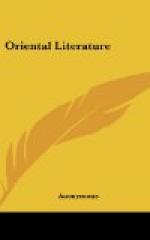On hearing these words Cais felt the light change to darkness before his eyes. “O thou son of a vile coward,” he exclaimed “how is it that you are not more respectful in your address to me?” He seized a javelin and plunged it into the breast of Abou-Firacah. Pierced through, the young messenger lost control of his horse.—Antar dragged him down and flung him on the ground. Then, turning the horse’s head away from the direction of Fazarah, he struck him on the flank with a holly-stick, and the horse took the road towards the pastures, and finally entered his stable, all covered with blood. The shepherds at once led him to the tents, crying out, “Misfortune! Misfortune!”
Hadifah became furious. He smote upon his breast, repeating the words: “Tribe of Fazarah, to arms, to arms, to arms!” and all the disaffected came to Hadifah once more, begging him to declare war on the Absians, and to take vengeance on them. “Kinsmen!” replied Hadifah, with alacrity, “let none of us sleep to-night without our armor on.” And so it happened.
At break of day Hadifah was on horseback; the warriors were ready, and only women and children and the feeble were left in the tents. Cais, on the other hand, after slaying Abou-Firacah, expected that the Fazareans would come and attack himself and his warriors; he therefore prepared for battle. Antar was charged with taking the necessary reconnoitre. He left in the tents only women, children, and those too feeble to bear the sword; then he put himself in command of the heroes of Carad. Nothing could be more brilliant than the ranks of the Absians in their coats of mail and gleaming weapons. These preparations caused an anxious moment for both parties. They marched forth against each other, and the sun had scarcely appeared, before scimitars flashed, and the whole country was in a turmoil.
Antar was impatient to press forward, and satisfy his thirst for battle; but, lo! Hadifah, dressed in a black robe, advances, his heart broken by the death of his son. “Son of Zoheir,” he cried to Cais, “it is a base action to slay a child; but it is good to meet in battle, to decide with these lances which shall predominate, you or me.” These words cut Cais to the quick. Hurried along by passion he left his standard and rushed against Hadifah. Then the two chiefs, spurred on by mutual hatred, fought together on their noble chargers, until nightfall. Cais was mounted on Dahir, and Hadifah on Ghabra. In the course of this combat the exploits of the past were eclipsed. Each tribe despaired of his chieftain’s safety, and they were eager to make a general attack, in order to stop the struggle of the chieftains and the fury with which they contended. Cries began to be heard in the air. Scimitars were drawn, and lances advanced over the ears of Arabian chargers. Antar approached certain Absian chiefs and said, “Let us attack the traitors.” He prepared to charge, when the ancients of the two tribes came forth




